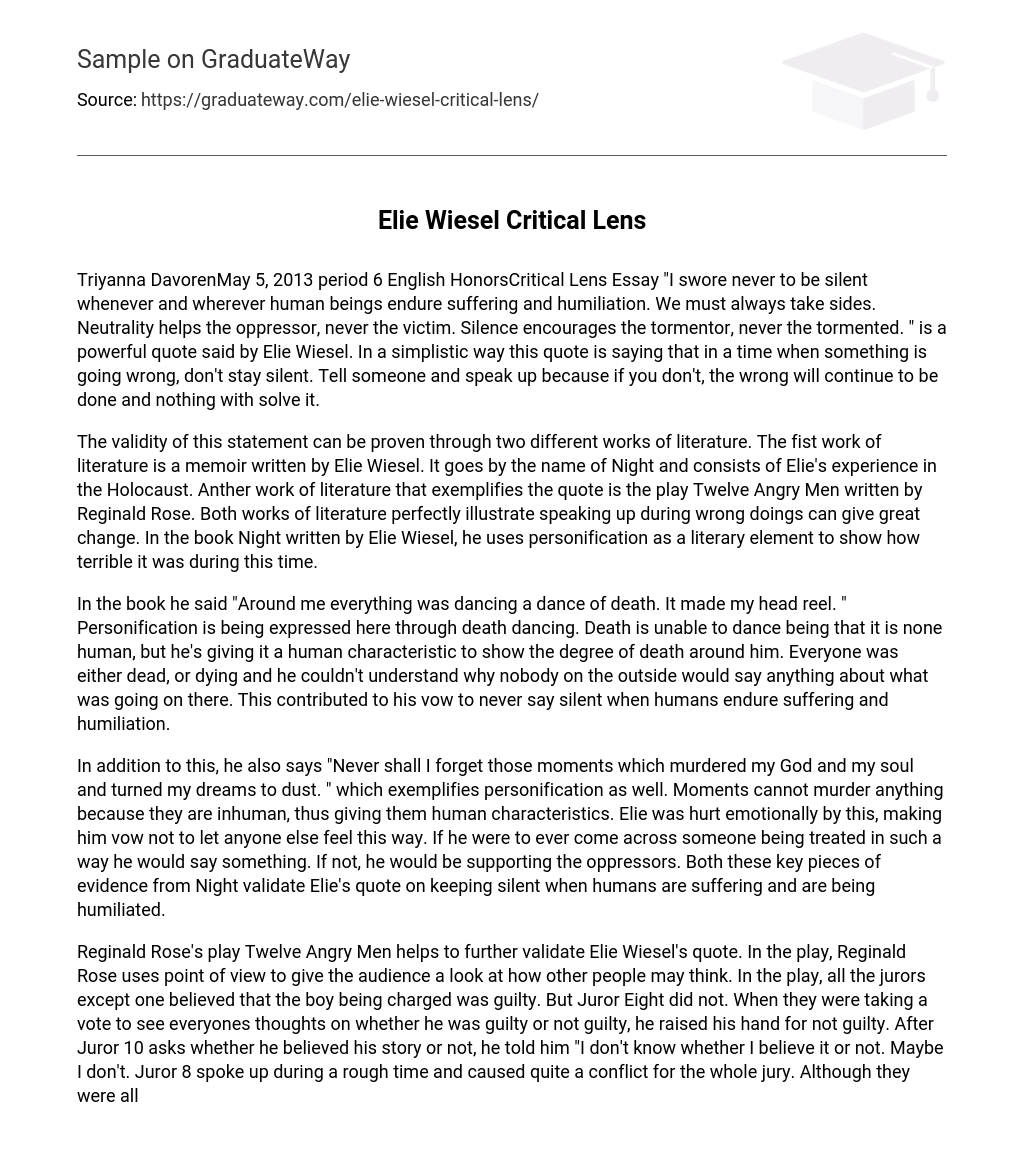“I swore never to be silent whenever and wherever human beings endure suffering and humiliation. We must always take sides. Neutrality helps the oppressor, never the victim. Silence encourages the tormentor, never the tormented.” – Elie Wiesel.
In a simplified manner, this quote by Elie Wiesel stresses the importance of not remaining silent in the face of injustice. It urges individuals to speak up and report wrongdoing, as silence only enables the oppressor and perpetuates suffering.
Both “Night” by Elie Wiesel and “Twelve Angry Men” by Reginald Rose demonstrate the validity of the statement that speaking up during wrongdoings can bring about significant change. “Night” is a memoir by Elie Wiesel that recounts his experiences during the Holocaust, while “Twelve Angry Men” is a play by Reginald Rose. In “Night,” Wiesel utilizes personification as a literary technique to portray the extreme horrors of this period.
In the book, the author describes a scene where everything around him appeared to be dancing a dance of death. This personification portrays death as if it were a human, emphasizing the overwhelming presence of mortality. The author observed that everyone in his surroundings was either dead or dying, but he couldn’t comprehend why outsiders remained silent about the grim situation. This experience further solidified his commitment to speaking out against human suffering and humiliation.
Furthermore, the quote “Never shall I forget those moments which murdered my God and my soul and turned my dreams to dust” also demonstrates personification. By attributing human actions, such as murder, to moments which are inanimate, Elie effectively conveys his emotional pain and his determination to prevent others from experiencing the same suffering. Elie asserts that he will speak up if he witnesses anyone being mistreated in a similar manner, as remaining silent would only perpetuate the oppression. These instances mentioned in Night provide compelling evidence that support Elie’s belief in speaking out against human suffering and humiliation.
Reginald Rose’s play Twelve Angry Men supports Elie Wiesel’s quotation by showcasing different perspectives. In the play, Rose utilizes the point of view to illustrate varying ways of thinking. Initially, all jurors except Juror Eight believed in the defendant’s guilt. However, Juror Eight differed, raising his hand in favor of “not guilty” during the vote. When Juror Ten questioned his belief in the defendant’s story, Juror Eight responded, “I don’t know whether I believe it or not. Maybe I don’t.” Despite facing strong opposition from the other jurors, Juror Eight continued to assert his opinion and attempted to present things from his own perspective. “All right. I had a peculiar feeling about this trial. Somehow I felt that the defense counsel never really conducted a thorough cross-examination. I mean, he was appointed by the court to defend the boy. He hardly seemed interested. Too many questions were left unasked.” Juror Eight’s statement emphasizes his unwavering commitment to his viewpoint.
He strongly believed that the boy was innocent and wanted to convince everyone to see it. He dedicated a significant amount of time to persuading the other jurors of the boy’s innocence. By providing examples and explanations, he was able to make his reasoning clear to the rest of the jurors. These two quotes from his actions support Elie Wiesel’s stance, as they demonstrate his refusal to back down in the face of opposition. He firmly believed that the boy would suffer unjustly and he could not tolerate such an injustice, just as Wiesel cannot stay silent when witnessing the humiliation of another human being.
Each quote from Twelve Angry Men demonstrates Elie Wiesel’s belief on the importance of addressing suffering and humiliation in the human experience. Wiesel’s statement, “I vowed to never remain silent in the face of suffering and humiliation endured by fellow human beings. We must always choose a side. Neutrality benefits oppressors, not victims. Silence empowers tormentors, not the tormented,” can be supported as valid. It is indeed true that remaining silent only aids the oppressor, not the victim. This assertion is evident in literary works like the novel Night and the play Twelve Angry Men.
Both Night and Twelve Angry Men offer distinct instances of why one should not remain silent when witnessing others endure suffering and humiliation. In Night, Elie Wiesel personally endures these tragedies, which compels him to promise to never stay silent when fellow humans experience such mistreatment. On the other hand, in Twelve Angry Men, Juror 8 realizes that some pieces of the puzzle do not align, leading him to prevent the death of a child based on unjustifiable reasons. These literary works exemplify Elie’s quote and effectively demonstrate its truthfulness.





